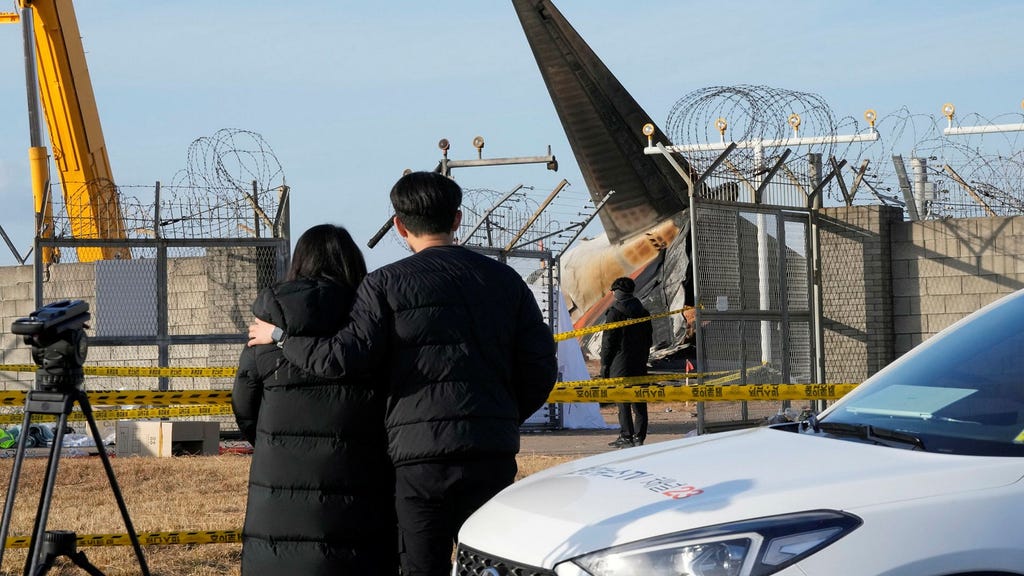The tragic crash of a Jeju Air Boeing 737-800 aircraft into a concrete wall during landing at Muan Airport in South Korea has claimed the lives of 179 individuals, marking the deadliest aviation accident in the nation’s history. In the wake of this devastating event, South Korea has declared seven days of national mourning, a testament to the profound impact of the loss on the nation’s collective consciousness. The scene at Muan Airport in the aftermath of the crash is one of immense grief and palpable tension. Relatives of the victims have gathered, anxiously awaiting the identification of their loved ones. Yellow tents have been erected to provide temporary shelter and respite for those who have stayed overnight, while the departure hall resonates with the sounds of weeping and prayers. The emotional toll on the families is evident, with one man expressing his profound heartbreak and disbelief at the sudden loss of his entire family. The agonizing wait for identification has been further compounded by the extent of the victims’ injuries, which has necessitated a meticulous and time-consuming process. This delay has fueled frustration and anger among some of the grieving families, who yearn for closure and the opportunity to mourn their loved ones properly.
The identification process, a painstaking undertaking involving DNA analysis and fingerprint matching, has managed to identify over 140 of the 179 victims. However, the slow pace of this process has drawn criticism from the victims’ families, who have called for more expeditious identification and greater support from both the government and Jeju Air. Their pleas reflect not only the emotional distress caused by the prolonged uncertainty but also a desire for accountability and a sense that their grief is being acknowledged and addressed. A poignant reminder of the scale of the tragedy is the establishment of a makeshift memorial altar in a local sports hall, where mourners can gather to pay their respects and offer solace to one another. The altar serves as a focal point for collective grieving, a testament to the shared sense of loss that has enveloped the nation.
Amidst the overwhelming grief and despair, there is a glimmer of hope. Two individuals, both members of the flight crew, miraculously survived the crash. One of the survivors, currently receiving intensive care, recounted being rescued after regaining consciousness, offering a harrowing glimpse into the immediate aftermath of the impact. The survival of these two crew members provides a small measure of solace in the face of such widespread devastation. The repercussions of the crash extend beyond the immediate human cost. Jeju Air, the airline operating the ill-fated flight, has experienced a significant drop in reservations, reflecting public concern over the safety of its operations. This decline in bookings underscores the erosion of public trust in the airline and the long-term challenges it faces in rebuilding its reputation.
Adding to the concerns about aviation safety, another Boeing 737-800 aircraft, the same model as the crashed plane, experienced technical difficulties, forcing it to return to its departure airport. This incident has prompted a comprehensive review of South Korea’s entire aviation system, highlighting the urgent need to address potential systemic issues and ensure the safety of air travel. The investigation into the cause of the Muan Airport crash is ongoing, with authorities meticulously examining all possible factors. Until the root cause is determined, the shadow of uncertainty will continue to loom over the aviation industry, both in South Korea and beyond.
The devastating crash at Muan Airport serves as a stark reminder of the fragility of life and the enduring impact of such tragedies on individuals, families, and entire nations. The outpouring of grief and support from across South Korea reflects the nation’s resilience and its commitment to honoring the memory of those lost. As the investigation continues and the nation grapples with the aftermath, the focus remains on providing comfort and support to the grieving families while working to prevent similar tragedies from occurring in the future. The road to recovery will be long and arduous, but the collective strength and determination of the South Korean people will undoubtedly guide them through this challenging time.
Beyond the immediate response and the ongoing investigations, the Muan Airport tragedy raises important questions about air safety regulations, emergency preparedness, and the responsibility of airlines and governments to ensure the well-being of passengers and crew. The incident serves as a wake-up call for the aviation industry worldwide, prompting a reassessment of existing safety protocols and a renewed commitment to prioritizing safety above all else. The lessons learned from this tragedy will hopefully lead to meaningful changes that will prevent future loss of life and enhance the safety of air travel for all. The memory of the 179 victims will serve as a constant reminder of the human cost of such accidents and the imperative to strive for a future where air travel is as safe as possible.














